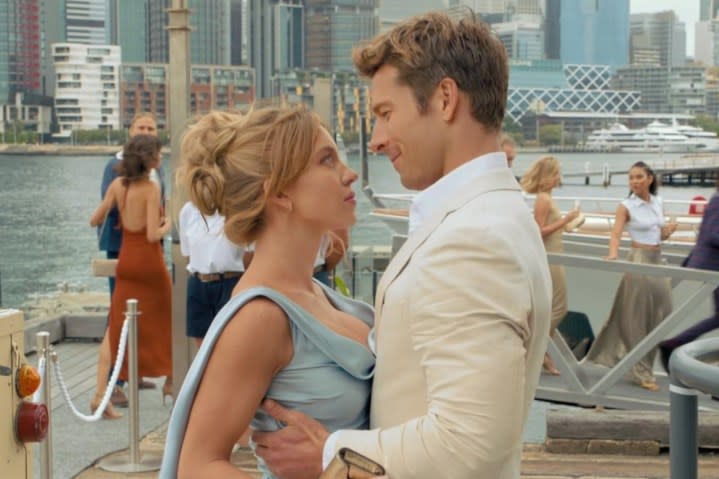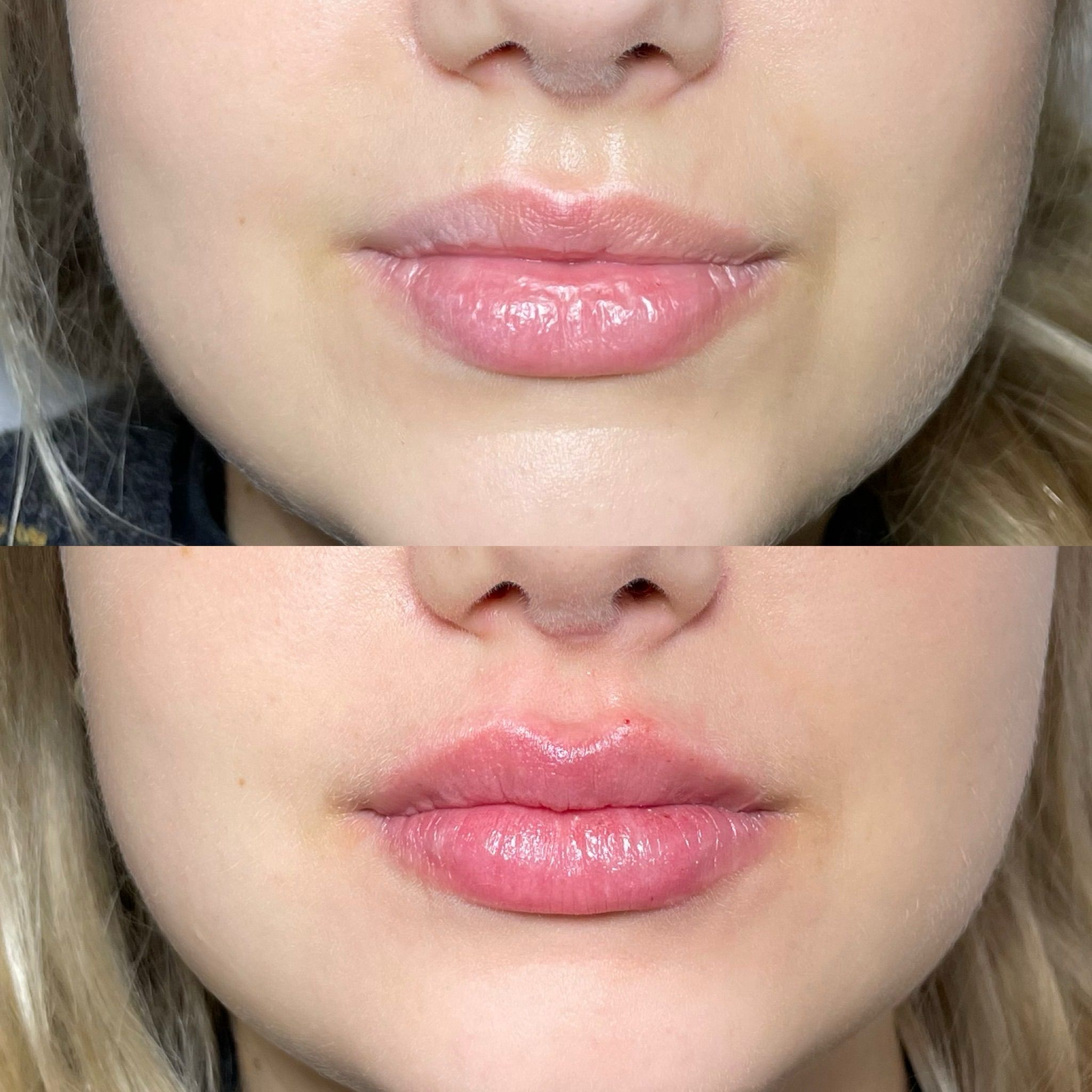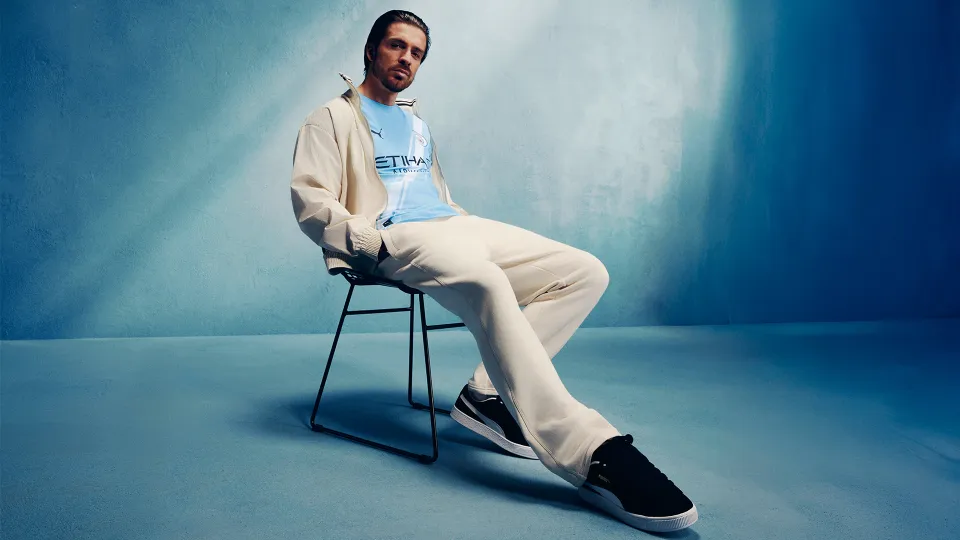Introduction: A Rom-Com Dressed to Impress
Hollywood has spent the past decade insisting the romantic comedy is back, yet most new entries feel small, cheaply assembled, and destined for streaming. Anyone but You—directed by Will Gluck and headlined by Glen Powell and Sydney Sweeney—arrives determined to reverse that trend. It flaunts sun-splashed Sydney locations, designer wardrobes, and tables groaning with the kind of catering that normally appears only in a Nancy Meyers fantasy. For ninety-plus minutes the film shouts, “Remember when rom-coms were glossy, theatrical events?”
The trouble is that craft alone cannot sell a love story. This film has beauty, budget, and two bona-fide “hot people.” What it lacks is the intangible friction that makes audiences ache for a couple’s happy ending.
Premise and Plot Mechanics
A Modern ‘Much Ado’
Gluck and screenwriter Ilana Wolpert borrow their structure from Shakespeare’s Much Ado About Nothing. Ben (Powell) and Bea (Sweeney) meet cute in a Boston coffee shop, wander through a movie-perfect date, then suffer a morning-after misunderstanding that curdles attraction into mutual loathing. Months later they collide at a destination wedding in Australia: Bea’s sister is marrying the sister of Ben’s best friend. To keep the peace—and to nettle assorted exes and parents—they agree to fake a relationship.
Complications on Cue
From that setup spin the required rom-com complications: jealous partners, meddling family members, drunken karaoke, and one spectacularly ill-advised cliff walk. Every beat lands exactly where a studio note would place it. Yet because Ben and Bea are sketched in shorthand—he’s a cocky finance bro who secretly reads Marcus Aurelius; she’s a nervous law-school dropout afraid of real intimacy—the stakes never feel urgent. Viewers observe the plot rather than inhabit it.
The Leads: Chemistry on Paper, Not in Practice
Glen Powell: Charming Until He Isn’t
Powell deploys the easy grin and loose-limbed swagger that made him a scene-stealer in Top Gun: Maverick. Early on, his laid-back magnetism seems a perfect fit for a modern Benedick. Over time that charm curdles into performative smugness; Ben’s self-satisfaction becomes the loudest thing on screen, drowning potential vulnerability.
Sydney Sweeney: A Movie Star Searching for an Inner Life
Sweeney pares away the operatic angst of Euphoria to play Bea as a woman stuck between ambition and anxiety. She looks luminously at home in couture sundresses, yet her line deliveries often land with anesthetized flatness—as if Bea, too, is admiring the scenery rather than feeling the moment. The result is not actively bad chemistry but an absence of sparks. Two glossy magazine covers are sharing the frame, smiling on cue. Connection never quite ignites.
Supporting Ensemble: Bright Spots in the Background
Comic Relief Down Under
When Anyone but You pauses to let its supporting cast riff, the film springs to life. Joe Davidson lampoons surf-bro enthusiasm as an Australian himbo who materializes whenever a scene needs oxygen. Bryan Brown mines sly laughs as a father-of-the-bride who treats family politics like battlefield strategy. Rachel Griffiths, granted too few lines, radiates warmth even while forced to suppress her natural accent.
Alexandra Shipp and Hadley Robinson: The Wedding That Works
As the marrying couple, Shipp and Robinson ground the film’s swirl of deceptions in a believable, affectionate partnership. Their subplot reminds viewers what a rom-com can feel like when emotion trumps clever contrivance.
Direction and Aesthetic Pleasures
Will Gluck’s Visual Polish
Gluck, whose Easy A and Friends with Benefits balanced snark with sincerity, shoots Sydney Harbour like an Architectural Digest spread. Sun-bleached beaches, sailboats slicing neon water, and Mediterranean villas on loan from social-media influencers give the movie an aspirational sheen. Costume designer Liz Wolf dresses Sweeney in high-waisted linen and Powell in crisp resort wear, underlining the fantasy.
Culinary Porn and Interior Design
The production design lingers on charcuterie boards, tiered pavlovas, and open-plan kitchens where every marble slab glows. These indulgences feel intentional: if the romance falters, at least the audience can crave the lifestyle. Yet escapist gloss cannot substitute for heartfelt stakes—luxury that doesn’t illuminate character finally becomes empty Instagram fodder.
Where the Script Slips
Jokes That Miss the Mark
Gluck peppers the screenplay with meta quips and twenty-something slang, but punchlines rarely surprise. Too often a promising setup segues into a familiar riff—Powell flexes, Sweeney rolls her eyes, boom-box serenade ensues. The film never finds the linguistic swordplay that made Much Ado crackle; instead it settles for banter that flatters neither actor’s timing.
Stakes Without Substance
Ben’s mission is to make an ex jealous; Bea’s is to appease image-conscious parents. Those goals evaporate whenever the plot needs another scenic excursion. Because the characters’ wounds and wants remain superficial, their eventual capitulation to love feels perfunctory. The grand romantic gesture arrives right on schedule, yet registers as a contractual obligation rather than catharsis.
The Problem of Relatability
Gods Among Mortals
Rom-coms thrive on imbalance: the underdog pining for Prince Charming, the mismatched souls locked in battle until they recognize shared vulnerability. Anyone but You casts two flawless specimens, then tries to convince viewers they are just-like-us neurotics. The screenplay dutifully includes moments where Ben laments his lack of purpose and Bea questions her self-worth, but neither actor can downshift into ordinariness without appearing false. Their sculpted beauty sabotages the film’s attempts at grounded insecurity.
Audience Identification Gap
When the protagonists board a private helicopter to sip Champagne over Sydney, the fantasy soars but empathy plummets. Viewers can admire the spectacle yet struggle to care whether these demi-gods discover the courage to admit mutual attraction. The rom-com contract—audience invests in lovebirds’ happiness—breaks down once aspiration eclipses emotion.
Comparative Context: Recent Rom-Com Attempts
Better (and Worse) Reboots of a Genre
• Crazy Rich Asians married luxury porn to earnest cultural specificity, yielding genuine swoon.
• Ticket to Paradise offered star wattage (Roberts, Clooney) but coasted on genial autopilot.
• Streaming fare like Set It Up and Love Hard delivered sporadic charm on modest budgets.
Anyone but You lands mid-pack: grander than most streaming titles, less sharp than its theatrical predecessors, and haunted by the genre’s ongoing identity crisis.
Can Chemistry Be Manufactured?
Directorial Tricks vs. Intrinsic Spark
Great rom-com pairings—Grant and Bullock, Meg Ryan and Hanks—radiate minute gestures of complicity: shared smiles, synchronized rhythms, a charge when proximity shrinks. Gluck attempts to manufacture that heat through forced situations—slow-motion pool exits, rain-soaked embraces, a creepy-cute spider rescue—but manipulation never quite disguises absence. Chemistry, like comedy, resists reverse engineering.
Final Assessment: A Flirtation That Falls Short
Points in the Film’s Favor
• A commitment to visual splendor rarely granted the genre today
• A supporting ensemble that occasionally steals the show
• Enough breezy pacing to qualify as painless holiday diversion
Where It Falters
• Leads so glossy they repel emotional investment
• A script that confuses plot gymnastics with romantic tension
• Jokes and stakes that evaporate before landing genuine feeling
Anyone but You is indeed superior to the algorithmic rom-coms littering streaming menus, yet it stops several strides shy of memorable. One leaves the cinema humming admiration for villas, wardrobes, and catering spreads—while struggling to recall a single line of dialogue that pierced the heart.
Conclusion: Swipe Right or Politely Pass?
If cinematic escapism is all you require—sun, abs, couture, Champagne—then Anyone but You provides a glossy, undemanding fling. Viewers seeking the ineffable tug of true romantic-comedic connection may find themselves glancing at their phones, wishing for the messy humanity that underpinned the genre’s classics.
The film tries valiantly to resuscitate the big-screen rom-com, but no amount of Botoxed scenery can replace chemistry or insight. In the end, love stories live or die on whether we feel anything for the people at their center. Hotness alone is not enough. As Ben and Bea finally, predictably, leap into each other’s arms, we admire the picture—just not the pulse.






